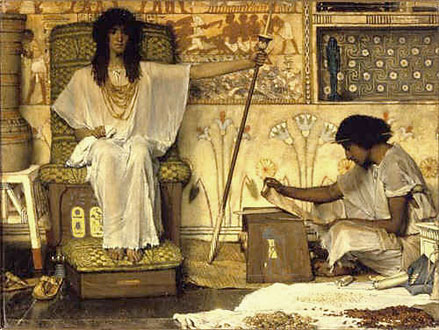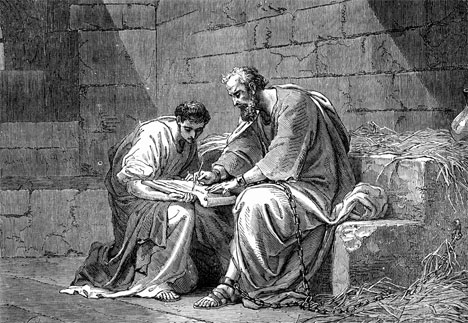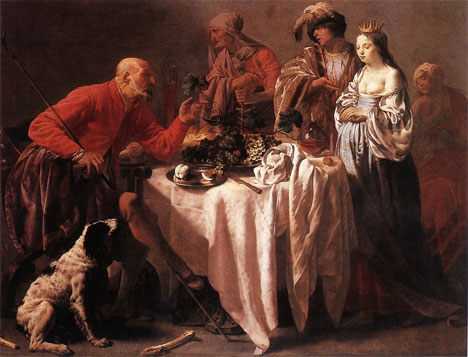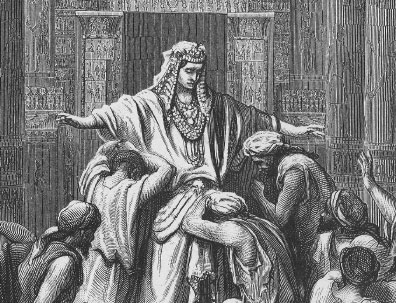Ambassadors in Chains
“But when you do a charitable deed, do not let your left hand know what your right hand is doing…” Matthew 6:3
When it comes to doctrine, Mark Driscoll defines all issues as either closed-handed or open-handed. The non-negotiable fundamentals are held with a closed hand. In the open hand are issues that can be debated without shafting a church’s faithfulness to the apostles’ doctrine.
Advice from a Sojourner
James Jordan has a great little commentary on Proverbs 30, the words of Agur (“sojourner”). Some believe the author of this chapter is Jacob. Jordan runs with this possibility and makes some wonderful observations.
May His Days Be Few
or Timeless Truth is a Tree
“Let his days be few, and let another take his office.” Psalm 109:8
The imprecatory Psalms seem to contradict the instruction of Christ to love our enemies. Ben Myers recently noted a campaign to pray for President Obama, to pray Psalm 109:8, that is:
Apparently some Southern Baptist pastors have been using Psalm 109:8 as a prayer for Obama’s death: “May his days be few; may another take his place of leadership. May his children be fatherless, and his wife a widow.” This even inspired a line of creepy bumper stickers and T-shirts that read “Pray for Obama.” One of these pastors says: “You’re going to tell me that I’m supposed to pray for the socialist devil, murderer, infanticide, who wants to see young children, and he wants to see babies killed through abortion and partial-birth abortion and all these different things. Nope. I’m not gonna pray for his good. I’m going to pray that he dies and goes to hell.”
Knowing As We Are Known
or Being a Truly Impure Thinker
“If you love me, you will keep my commandments.” John 14:15
NOTE: THIS POST HAS BEEN REMIXED AND INCLUDED IN GOD’S KITCHEN.
You must be logged in to see the rest of this post.
Join now for a year for $15!
Peter Leithart wrote this week:
How do we know things? Experimentation, deduction, observation?
In Genesis, knowledge is first associated with two things – with food and with sex. There is a tree of the knowledge of good and evil, whose fruit opens the eyes of Adam and Eve so that they perceive that they are naked. Then Adam knows his wife and she conceives Cain.
If we want a strictly biblical answer: Knowledge is eating. Knowledge is sex.
Joseph’s Dysfunctional Family
Warren Gage/Christopher Barber and then James Jordan on Joseph’s wisdom:
“How strange Joseph’s behaviour toward his brothers appears to a modern reader! He recognises his brothers immediately but maintains his Egyptian disguise. He speaks harshly to them and then only through an interpreter. He charges them with spying — a capital crime for which he can sentence them to death. He takes one brother as a hostage. He returns their silver as they go home for the first time, and then he sets the brothers up in order to accuse them of stealing his silver cup on their second return trip, at which point he has them arrested. In short, he terrifies them.
What does this all mean? Is Joseph seeking revenge? Clearly that is not the case, for he so loves them he can hardly restrain himself fom revealing his identity — and his forgiveness — to them. Surely he is not vengeful. Why does he act this way? And why does the text go to such lengths to describe all of this?
Knowledge and Wisdom
“If you strike me down, I shall become more powerful
than you can possibly imagine.” —Ben Kenobi
Herod and Vader are maggot-filled men. They are the living dead. Christ and Kenobi are willing to die. They become the dead living.
One factor the Bible matrix continually brings out in its various occurrences throughout Scripture is the transformation of knowledge into wisdom — through death. In some profound way, knowledge is singular but wisdom is plural.
The Lord gives Adam the knowledge of the Law, and Adam is expected to obey and become wise. We can see, in his failure to confess his sin, that he was no wiser than before.
Power on Her Head
The Nazirite Vow
(Article requested by Drew J.)
This vow in Numbers 6 follows the “inspection of jealousy” in Numbers 5. Mark Horne observed that, just as the woman in Numbers 5 was to be inspected for harlotry with her hair untamed, so the Nazirite (whether male or female) was not to cut his or her hair. A Nazirite is a human picture of the church as a warrior bride. Hair is glory. Hair is the cloud of angels (and now, saints) surrounding the throne of God.
“Therefore the woman ought to have a symbol of authority on her head, because of the angels.” (1 Cor. 11:10)
A woman is the glory of her man. A woman’s hair is a symbol of submission, but also a symbol of her own “cloud of angels” – her godly offspring (See Ezekiel 5 for the children of Israel symbolised as the prophet’s hair, Micah 1:16, Matthew 10:30 and also my comments on Nehemiah and his hair-pulling). In battle, a Nazirite was like a blazing torch (the Ark-chariot/Adam) and smoking firepot (the smoke clouds of the incense altar/Eve army), parting his enemies like the pillar of God.
The hair is her “crop”, the twelve stars around her head (Rev. 12), and the question constantly posed to Israel concerns her role as God’s mediatorial Land. Is her crop one of thorns and thistles, or is it godly grain? This is also the question in Numbers 5, and the Lord put Israel to this exact test after the idolatry with the golden calf. The “harlots” were slain with the Levitical sword.
The Nursery of Culture
In his lectures on worship, James Jordan comments:
The church is the first form of the kingdom. The church is also the nursery of the kingdom. It’s within the institutional church that the fundamental principles of the kingdom are taught and learned. Christians learn government through the church government of elders. Having learned that, Christians are then ready to govern in more broad circumstances. We learn finances in the church, through the administration of the tithe. We learn charity in the church because we are starving and God feeds us bread and wine.
We learn music in the church. All of western music flows out of the music of the church. All of western theatre flows out of the liturgy of the church. All of western literature flows out of the literature of the church.
The church creates civilisation. The church is the nursery of culture.1
Western culture, then, is at the stage of Solomon with his idolatrous wives. The church is now just mimicking the corrupted culture of the world instead of being the pioneer. And we know what happened to Solomon’s kingdom.
1 Ten Principles of Worship, Lecture 1. Available from www.wordmp3.com
Two Trees – 1
If the Bible were only about salvation by grace, it would be a lot shorter. It is about a growth from childhood to maturity, from nakedness to glory.
Jesus grew in wisdom and stature. That goes back to the two trees in the garden, bread (obedient priesthood) and wine (kingly wisdom).
Jesus carried the people of God through Adam’s testing (breaking the bread), beyond the tree of life, to the tree of wisdom (poured out wine).
‘of Him you are in Christ Jesus, who became for us wisdom from God’ (1 Cor. 1:30)
‘in whom are hidden all the treasures of wisdom and knowledge.’ (Col 2:3)
He is both trees, and now we eat and drink Him freely before God.

































